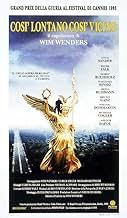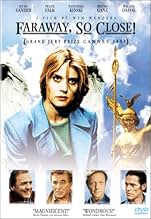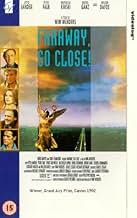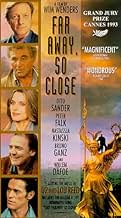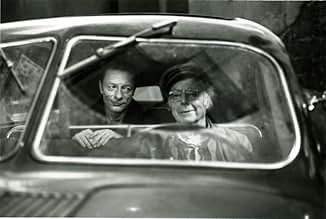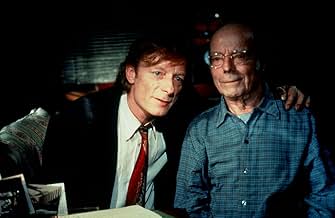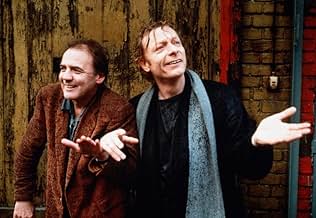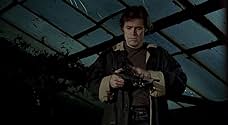AVALIAÇÃO DA IMDb
7,2/10
9,6 mil
SUA AVALIAÇÃO
Um grupo de anjos na capital alemã olha longamente para a vida dos seres humanos.Um grupo de anjos na capital alemã olha longamente para a vida dos seres humanos.Um grupo de anjos na capital alemã olha longamente para a vida dos seres humanos.
- Direção
- Roteiristas
- Artistas
- Prêmios
- 4 vitórias e 7 indicações no total
Mikhail Gorbachev
- Mikhail Gorbachev
- (as Michail S. Gorbatschow)
Avaliações em destaque
10Cassiel
Although it has received mixed reviews by critics, this follow-up to "Der Himmel über Berlin" (1987) is a deeply moving and beautiful film. Wenders explores the polarities which exist in a newly unified Berlin and in so doing examines some of the polarities which exist in life itself. As "Cassiel," Otto Sander has given us another endearing Wenders protagonist who learns all too quickly about what life (and time) can present upon an individual. Laurent Petitgand's stunning musical score enhances the sublime images photographed by Jürgen Jürges. Although "Der Himmel über Berlin" (1987), is an almost mandatory pre-requisite, "In weiter Ferne, so nah!" (1993) is a vastly different film which proves itself in its own right.
Cinema has produced many wonderful films over the past century or so, but when looking at the various elements of film combined here, there is no other movie which touches me quite so positively, quite as deeply as this one.
Cinema has produced many wonderful films over the past century or so, but when looking at the various elements of film combined here, there is no other movie which touches me quite so positively, quite as deeply as this one.
It's difficult to make a sequel as good as the original. If it's done in the same style, it becomes a poor shadow. Here, Wim Wenders has made something different than in "Wings of Desire:" what I consider a comedy of a misfit ex-angel, to counter the desire of an angel to become human in the other film.
Near the end of the other movie, we saw one of the angels, Damiel, become human for the love of a beautiful trapeze artist. In this film, we see the other angel, Cassiel, become human by accident as he wanted to help people. As much as he wanted to fit in with our world, the more he tried to do good, the worse trouble actually made of things. He often quotes the Lou Reed song he heard: "Why can't I be good, make something of this life?"
There is a cameo appearance of a world leader, when Mikhail Gorbachev (filmed the summer after resigning as Soviet president) ponders the age-old question about the meaning and purpose of life; or two leaders if counting that the guard dog's name is Khadafy. There are jokes about getting lost between East and West, since the Wall no longer was there as a landmark. But there is the serious side at the beginning, of the war and the Nazi past, which is a little hard to follow. I almost forgot about it as I got caught up in the humor of the fallen angel, but even that had the darker side of an evil angel who was leading him astray. Yet the ending tied everything together nicely.
Like "Wings of Desire," there are nice transitions between black and white, which is how the angels see the world, and color, for how humans see things. There is also a poem started at the beginning, about humans being everything to the angels, when Cassiel looks down from the statue to "you whom we love." The angels are just the "messengers who bring light to those in darkness." The poem is repeated at the ending, adding that the message is love.
The angels lament that humans can only believe what they can see and touch. The Wall fell, the tangible symbol of the division between East and West, yet still one driver whose thoughts we heard couldn't see what the difference was between the two areas; freedom can't be seen or touched. Love, the angels message, can be neither seen nor touched, yet that, and not "blood and steel" (as said the Russian poet and diplomat that Gorbachev quotes), is what is needed for there to be peace.
Near the end of the other movie, we saw one of the angels, Damiel, become human for the love of a beautiful trapeze artist. In this film, we see the other angel, Cassiel, become human by accident as he wanted to help people. As much as he wanted to fit in with our world, the more he tried to do good, the worse trouble actually made of things. He often quotes the Lou Reed song he heard: "Why can't I be good, make something of this life?"
There is a cameo appearance of a world leader, when Mikhail Gorbachev (filmed the summer after resigning as Soviet president) ponders the age-old question about the meaning and purpose of life; or two leaders if counting that the guard dog's name is Khadafy. There are jokes about getting lost between East and West, since the Wall no longer was there as a landmark. But there is the serious side at the beginning, of the war and the Nazi past, which is a little hard to follow. I almost forgot about it as I got caught up in the humor of the fallen angel, but even that had the darker side of an evil angel who was leading him astray. Yet the ending tied everything together nicely.
Like "Wings of Desire," there are nice transitions between black and white, which is how the angels see the world, and color, for how humans see things. There is also a poem started at the beginning, about humans being everything to the angels, when Cassiel looks down from the statue to "you whom we love." The angels are just the "messengers who bring light to those in darkness." The poem is repeated at the ending, adding that the message is love.
The angels lament that humans can only believe what they can see and touch. The Wall fell, the tangible symbol of the division between East and West, yet still one driver whose thoughts we heard couldn't see what the difference was between the two areas; freedom can't be seen or touched. Love, the angels message, can be neither seen nor touched, yet that, and not "blood and steel" (as said the Russian poet and diplomat that Gorbachev quotes), is what is needed for there to be peace.
Wim Wenders may not be taken seriously by Hollywood (or critics) anymore, but he seems able to pull in actors and musicians at will. Great soundtrack.
Great cast as well. Check out Horst Bucholz (sp?) here and in the 1962 comedy "One, Two, Three" with James Cagney. All the "mortals", especially Bruno Ganz, seem almost gleeful. Only Willem Dafoe appears to be in a "serious German movie".
I may not be qualified to comment on the real value of this movie because "Wings of Desire" is in my permanent top 5. It probably benefits from the glow of it's precursor more than any other sequel, because I really wanted to catch up with these characters. I smiled every time I saw a familiar face.
That said, it takes about an hour to settle in but finally gets sort of serious. Watching this and "Until the End of The World" (also ripped by critics) I get the feeling Wenders was either being lazy or just freestyling to avoid boredom. Looks like fun from here.
Great cast as well. Check out Horst Bucholz (sp?) here and in the 1962 comedy "One, Two, Three" with James Cagney. All the "mortals", especially Bruno Ganz, seem almost gleeful. Only Willem Dafoe appears to be in a "serious German movie".
I may not be qualified to comment on the real value of this movie because "Wings of Desire" is in my permanent top 5. It probably benefits from the glow of it's precursor more than any other sequel, because I really wanted to catch up with these characters. I smiled every time I saw a familiar face.
That said, it takes about an hour to settle in but finally gets sort of serious. Watching this and "Until the End of The World" (also ripped by critics) I get the feeling Wenders was either being lazy or just freestyling to avoid boredom. Looks like fun from here.
I recommend this film to all the jaded and cynical people of the world. It will touch the core of your heart and give you a spiritual yearning for that which we cannot see. When Cassiel falls to earth he can finally touch, feel, hear and experience the feelings of loneliness and joy. He finds his existence on earth in Berlin difficult and finds it hard to comprehend the swift passing of time and the limited outlook of the individual who can only see their own reality in how it affects them. Natassja Kinski who plays Angel Raphaela is on hand to offer comfort and solace to Cassiel when he begins to despair. The sweeping contrasts between black & white and colour add profound depth to this movie, as do the real people who play themselves : Gorbachev, Lou Reed and Peter Falk. Wim Wenders who directed this movie is a foresighted genius of compassion and ethereal visions.
To enjoy this movie, view it as a poem. It relies on the language of the heart and asks its viewers to see it as it truly is, through the same myopic eyes to try and understand a dream. There is the duality of existence we all face, mirrored through the experience of an angel who falls to earth, who falls precisely because he can no longer contain himself within the restrictions of his identity. The central metaphor of this movie is about the passion, truth and love we are all promised, should we choose to live life as we were meant. There are the difficulties of trying to live out our singular purpose, the disappointments of relation, the trials of being part of something greater than self. In all these, there is also the beauty inherent, and ultimate understanding. The triumph of beautiful release, when we realise that all that has gone before is both behind us and a part of what we are, and the relief of becoming an individual, and understanding and embracing aspirations gained and lost.
Você sabia?
- CuriosidadesMikhail Gorbachev: only appears because his secretary was familiar with the movies of Wim Wenders and was a great admirer. She talked Gorbachev into giving up a couple of hours to do the cameo as he was on a trip to Germany anyway.
- Erros de gravaçãoAfter Cassiel meets Anton Becker and returns to Angelo's pizzeria, he meets Emit Flesti and Damiel puts his flour stained hands on Flesti's shoulder, leaving a white mark on the black suit. The next time we see Flesti, moments later, there is no white mark.
- Citações
Emit Flesti: Let me explain a couple of things. Time is short. That's the first thing. For the weasel, Time is a weasel. For the hero, Time is heroic. For the whore, Time is just another trick. If you're gentle, your Time is gentle. If you're in a hurry, Time flies. Time is a servant, if you are its master. Time is your god, if you are its dog. We are the creators of Time, the victims of Time, and the killers of Time. Time is timeless. That's the second thing. You are the clock, Cassiel.
- Cenas durante ou pós-créditosThe film is dedicated to actor Curt Bois who worked with Wim Wenders in "Der Himmel über Berlin".
- Versões alternativasThe original running time at the world premiere in Cannes in May 1993 was 165 minutes. Despite winning the 'Grand Prize of the Jury' for this version, the director re-edited the film to make it shorter and improve the narrative. Unfortunately, the original version was never released again, so the Cannes reviews are actually about a slightly different film, than the 146 minutes version we know today.
- ConexõesFeatured in U2: Stay (Faraway, So Close!) (1993)
- Trilhas sonorasBerlin
Written and Performed by Lou Reed
Principais escolhas
Faça login para avaliar e ver a lista de recomendações personalizadas
- How long is Faraway, So Close!?Fornecido pela Alexa
Detalhes
- Data de lançamento
- País de origem
- Idiomas
- Também conhecido como
- Faraway, So Close!
- Locações de filme
- Sophienkirche, Große Hamburger Str. 29-30, Mitte, Berlim, Alemanha(background exterior, Cassiel and Damiel walking to his restaurant)
- Empresas de produção
- Consulte mais créditos da empresa na IMDbPro
Bilheteria
- Orçamento
- US$ 10.500.000 (estimativa)
- Faturamento bruto nos EUA e Canadá
- US$ 810.455
- Fim de semana de estreia nos EUA e Canadá
- US$ 55.019
- 26 de dez. de 1993
- Faturamento bruto mundial
- US$ 810.455
- Tempo de duração
- 2 h 26 min(146 min)
- Cor
- Mixagem de som
- Proporção
- 1.66 : 1
Contribua para esta página
Sugerir uma alteração ou adicionar conteúdo ausente


